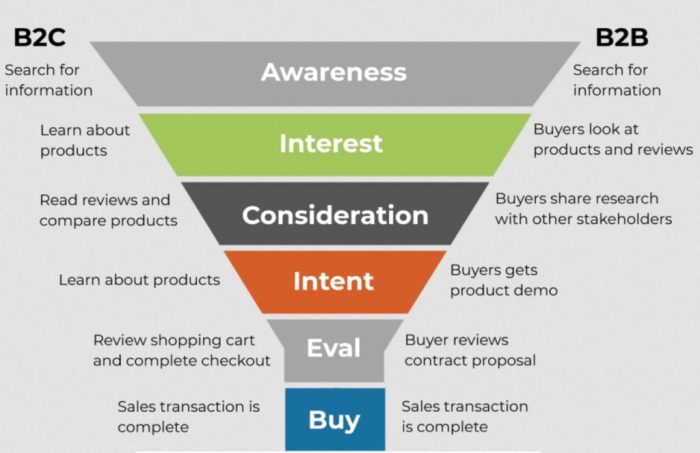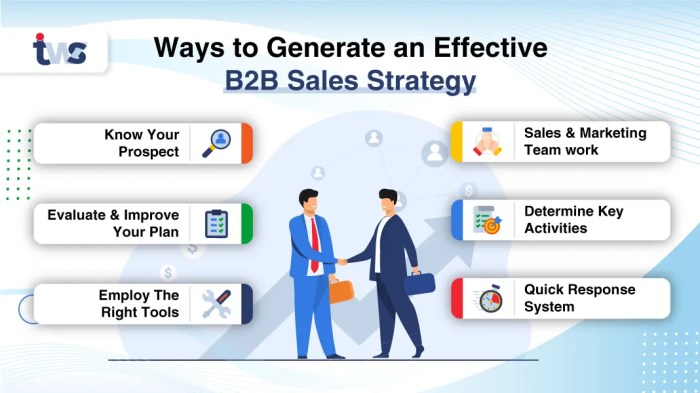Developing a B2C Sales Strategy dives into the essentials of creating a winning approach in today’s fast-paced business landscape. From defining key components to leveraging technology, this topic is all about boosting sales and connecting with customers in style.
Get ready to explore the ins and outs of formulating a killer B2C sales strategy that sets you apart from the competition.
Understanding B2C Sales Strategy
When it comes to business-to-consumer (B2C) sales strategy, it is all about how companies market and sell their products or services directly to individual consumers. This strategy is crucial for businesses looking to reach a wide customer base and drive sales effectively.
Key Components of a Successful B2C Sales Strategy
A successful B2C sales strategy typically includes the following key components:
- Target Audience Identification: Understanding the specific demographics, behaviors, and preferences of the target audience to tailor marketing efforts.
- Personalized Marketing: Creating personalized experiences for customers through targeted advertising, email campaigns, and promotions.
- Omni-Channel Approach: Utilizing multiple channels such as online platforms, social media, and physical stores to reach customers wherever they are.
- Customer Relationship Management: Building and maintaining strong relationships with customers to encourage repeat purchases and loyalty.
- Data Analysis: Using data analytics to track customer behavior, preferences, and sales patterns to optimize marketing strategies.
Examples of Companies Excelling in B2C Sales Strategies
Several companies have excelled in implementing successful B2C sales strategies, including:
- Amazon: Known for its personalized recommendations, seamless shopping experience, and efficient delivery services.
- Apple: Utilizes a combination of innovative product design, strong brand loyalty, and customer engagement to drive sales.
- Nike: Focuses on building a strong brand image, engaging with customers through social media, and offering exclusive products and experiences.
Market Research and Audience Segmentation

Market research is the backbone of any successful B2C sales strategy. By conducting thorough research, companies can gain valuable insights into consumer behavior, preferences, and trends in the market.
One crucial aspect of market research is audience segmentation, which involves dividing the target market into specific groups based on demographics, psychographics, behavior, or other factors. This segmentation allows businesses to tailor their marketing messages and strategies to different consumer segments, increasing the chances of reaching and engaging with their target audience effectively.
The Importance of Market Research in B2C Sales Strategy
Market research helps businesses understand their target audience better, enabling them to create products and services that meet consumers’ needs and preferences. It also allows companies to identify market trends, competitive landscape, and opportunities for growth.
- By analyzing consumer feedback and data, businesses can refine their products or services to better align with consumer expectations.
- Market research helps companies identify new market segments or niches that they can target to expand their customer base.
- Understanding the competition through market research allows businesses to differentiate themselves and develop unique selling propositions that resonate with consumers.
Audience Segmentation in Targeting Consumers, Developing a B2C Sales Strategy
Segmenting the target audience allows businesses to create personalized marketing campaigns that speak directly to the needs and preferences of different consumer groups. This targeted approach increases the effectiveness of marketing efforts and drives higher engagement and conversions.
- Demographic segmentation divides consumers based on age, gender, income, education, etc., helping businesses tailor their messaging and offers to specific groups.
- Psychographic segmentation categorizes consumers based on lifestyle, interests, values, and attitudes, enabling businesses to create more resonant marketing messages.
- Behavioral segmentation focuses on consumer purchasing behavior, loyalty, usage patterns, and benefits sought, allowing companies to target consumers with relevant offers and promotions.
Examples of Market Research Influencing B2C Sales Strategy Decisions
Market research has played a pivotal role in shaping B2C sales strategy decisions for many successful companies. Here are some examples:
-
After conducting market research, a cosmetic company discovered a growing trend in eco-friendly beauty products. They launched a new line of sustainable cosmetics, targeting environmentally-conscious consumers and significantly increasing sales.
-
A tech company used market research to identify a gap in the market for affordable smartphones with advanced features. They developed a budget-friendly smartphone line that catered to price-sensitive consumers, resulting in a surge in sales and market share.
-
A clothing retailer segmented their audience based on style preferences and shopping habits. By tailoring their marketing campaigns to specific style categories and offering personalized recommendations, they saw a boost in customer engagement and repeat purchases.
Developing a Customer-Centric Approach: Developing A B2C Sales Strategy

In the world of B2C sales, putting the customer at the center of your strategy is crucial for success. By focusing on the needs and preferences of your target audience, you can build strong relationships and drive sales effectively.
Building Strong Customer Relationships
One strategy for building strong customer relationships in a B2C context is to prioritize excellent customer service. Responding promptly to inquiries, addressing concerns, and providing personalized support can go a long way in fostering loyalty.
Additionally, engaging with customers through various channels such as social media, email marketing, and personalized promotions can help create a sense of connection and exclusivity.
Personalization for Enhanced Effectiveness
Personalization plays a key role in enhancing the effectiveness of a B2C sales strategy. By tailoring product recommendations, marketing messages, and promotions to individual customer preferences, you can increase engagement and conversion rates.
Utilizing customer data and analytics to create personalized experiences, such as customized product suggestions based on past purchases or behavior, can help build trust and loyalty with your audience.
Leveraging Technology in B2C Sales
In the world of modern B2C sales, technology plays a crucial role in shaping successful strategies. By leveraging the right tools and platforms, businesses can streamline their sales processes, improve customer engagement, and drive revenue growth.
The Role of CRM Systems in Optimizing B2C Sales Processes
Customer Relationship Management (CRM) systems have revolutionized the way businesses interact with their customers. These platforms enable companies to store customer data, track interactions, and analyze buying patterns to create more personalized and targeted marketing campaigns.
- CRM systems help businesses identify high-value customers and tailor their sales approach accordingly.
- By centralizing customer information, sales teams can access real-time data to make informed decisions and provide better customer service.
- Automation features in CRM systems streamline tasks like lead management, email marketing, and follow-ups, saving time and increasing efficiency.
Examples of Innovative Technologies Transforming B2C Sales Strategies
Innovative technologies continue to reshape the landscape of B2C sales, offering new ways to engage customers and drive conversions. Here are some examples of cutting-edge tools that are transforming sales strategies:
- AI-Powered Chatbots: Chatbots use artificial intelligence to provide instant customer support, answer queries, and guide users through the sales process, enhancing customer experience.
- Augmented Reality (AR) and Virtual Reality (VR): AR and VR technologies allow customers to visualize products in real-world settings, offering a more immersive shopping experience and reducing the need for in-person trials.
- Personalization Engines: Advanced personalization engines analyze customer data to deliver tailored product recommendations, personalized offers, and targeted content, increasing customer engagement and driving sales.
